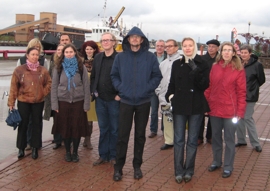Editors’ Seminar for the launch of a virtual Library of the Baltic Sea
Ventspils, Latvia, September 30 – October 3, 2008
Minutes
 The first day of Editors’ Seminar discussions built on an opening address by convenor Klaus-Jürgen Liedtke, who recapitulated both past efforts and present ambitions relating to a virtual Baltic library. This was followed by two commissioned contributions. Hans Peter Neureuter, professor emeritus (Regensburg, D), outlined the cultural identity of the Baltic Sea area as a literary sphere. Tor Eystein Øverås (Bodø, N), writer, sketched both historical and present-day modes and manners of travel writing practiced in the area, including his own.
The first day of Editors’ Seminar discussions built on an opening address by convenor Klaus-Jürgen Liedtke, who recapitulated both past efforts and present ambitions relating to a virtual Baltic library. This was followed by two commissioned contributions. Hans Peter Neureuter, professor emeritus (Regensburg, D), outlined the cultural identity of the Baltic Sea area as a literary sphere. Tor Eystein Øverås (Bodø, N), writer, sketched both historical and present-day modes and manners of travel writing practiced in the area, including his own.
The discussion that followed testified to the wealth of potential approaches and structuring principles that can be advocated for and might be challengingly applied to the making of a virtual library centering on the Baltic.
As Klaus-Jürgen Liedtke summed up the discussion: “‘The Baltic Sea of Words’ is to be seen as a whole, as a topic, thus carrying the interculturally connected literatures including echoes of other texts. Starting from today’s separation we see the need of crossing borders in our quest for the Baltic in our minds, the lost neighbours.”
An appreciable degree of consensus seemed to prevail around the notions that
- for inclusion in the library a writer needs neither provenance nor residence in the Baltic area: texts on life by this sea (or in its cultural, economic, political &c catchment area) certainly qualify, but so do texts based on (participant) observation and outright foreignization.
- some articulated relationship to the common sea – be it conflictive, embracing, or noncommittal – should inform the texts: they should relate to the fact of the Baltic’s existence, i.e. be recognizably ostseeisch.
- there should be no chronological limits on inclusion: for the Baltic to emerge fully as a scene of interaction and conflict, of cooperation and enmity, the library needs to accommodate the entire time span covered by written documents. The editorial approach will focus on the longue durée, the threads of commerce and cultural exchange from medieval times until today, from Latin as lingua franca to English, from folk poetry and documents of the Viking era to contemporary texts.
- texts mapping historical change are to be included in the selection: eg. The Tin Drum by Günter Grass and Hanemann by Stefan Chwin. An initial question to be addressed is that of which texts are to be given priority, which texts are paradigmatic for the region.
- literary quality takes precedence over instructiveness but texts that illustrate "dead ends," i.e. that might serve as deterrents in relation to the vagaries of the Baltic, might also qualify.
It was further agreed that
- once the principles of text inclusion have been further refined, editors’ personal tastes need to be taken into account: the library must not be allowed to develop into a sum total of the leading works of pre-defined literary canons from around the Baltic.
- the library is seen as a rhizome – not as a tree, not a canon, but as a dynamic process. The rhizomatic resources of the medium should be duly exploited to enable library users to look at and appreciate texts in ways and combinations different from those set down by history, language, and forms of political and national dominance.
- the library should offer opportunities for interactivity and the use of other media (visual, audio) to enrich its offerings.
- a recognizable concept must be kept in focus: for this reason an initial core drawn from the entire area is preferable to cumbersome compendia from all contributors; this core will subsequently be supplemented by processes of accretion and snowballing. In other words, the library will develop over time into a Babel project, forming clusters of interconnections. The common point of departure for the editor is: “What do I want the others to see, which literature do I want to offer?”
- editorial comments should provide a brief context for the text in question, an argument for why it has been chosen and a short biography of the author. These notes are to be linked to indices.
- there was a shared interest in one specific stratum, or genre, i.e.. that of travel writing exposing the region to ‘the foreign eye’. Paradigmatically: A moves from X to Y and writes back to X in a way that will interest X as well as Y and Z, for reasons both of good writing and acuity of observation.
Clas Zilliacus, Åbo/Turku, Finland
